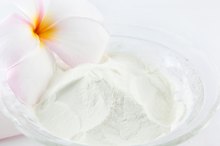What Causes Stretch Marks On the Lower Back?
It's not particularly unusual to see stretch marks on a young man's back. During puberty, when a youth is growing rapidly, his skin is required to stretch faster and farther than it's capable of doing. Males have a tendency to get stretch marks on their backs.
Boys Yes, Girls, No
Girls, unlike boys, generally will get stretch marks--if they get them at all--on their breasts, hips and thighs rather than on their backs, according to Warwickshire.nhs.uk.
Dermis, Epidermis
What Causes Stretch Marks on the Legs?
Learn More
Stretch marks can occur any time that rapid growth takes place, which causes the skin to be stretched. The marks actually take place in the dermis of the skin (the middle layer), which supports the epidermis (the outer layer). In the case of back stretch marks, if a young male is getting taller and wider so rapidly that his body can't keep up, the fibers in the dermis on his back become thin due to being overstretched. At that point, the fibers break.
- Stretch marks can occur any time that rapid growth takes place, which causes the skin to be stretched.
- In the case of back stretch marks, if a young male is getting taller and wider so rapidly that his body can't keep up, the fibers in the dermis on his back become thin due to being overstretched.
Red to White
Stretch marks look red when they first appear, although they'll fade into a white or gray color. The red color is because of the presence of blood vessels that lie beneath the skin, which are revealed when the fibers in the dermis break and little tears result.
Marfan Syndrome
Amino Acids to Produce Collagen
Learn More
Marfan Syndrome is a disorder that causes stretch marks on the back and elsewhere. This disease, which is genetic, affects connective tissue in the body, according to Medicinenet.com 1. The connective tissue is defective and isn't able to provide a framework for development and growth. Those with Marfan's can get stretch marks even though their weight doesn't change. These stretch marks can strike at any age but don't pose any serious health risks.
- Marfan Syndrome is a disorder that causes stretch marks on the back and elsewhere.
- Those with Marfan's can get stretch marks even though their weight doesn't change.
Predisposed
Abateit.com notes that some people are predisposed to getting stretch marks because their skin is producing insufficient amounts of elastin and collagen, the components that form the connective tissue in our skin. If an individual's skin is deficient in collagen and elastin, when it's stretched the tissue is more likely to tear and result in stretch marks.
Glucocorticoids
Glucocorticoids, which are secreted by the adrenal glands, have been found to prevent fibroblasts from regenerating and repairing elastin and collagen. The medical community isn't sure if glucocorticoids cause the stretch marks or just make the appearance of them on your skin more likely, according to Dermstore.com (see Resources). If an individual is using skin ointments or creams containing steroids (e.g. hydrocortisone) for an extended period or is taking high doses of oral corticosteroids, this can result in stretch marks on the lower back and elsewhere, according to Kidshealth.org (see Resources). Bodybuilders and weightlifters have a tendency to get stretch marks because of their rapid weight gain.
- Glucocorticoids, which are secreted by the adrenal glands, have been found to prevent fibroblasts from regenerating and repairing elastin and collagen.
- The medical community isn't sure if glucocorticoids cause the stretch marks or just make the appearance of them on your skin more likely, according to Dermstore.com (see Resources).
Possible Melanin Connection
Another possible reason for stretch marks on your lower back or elsewhere is the theory that when the skin stretches it affects skin pigment, or melanin. It's possible that dermal collagen becomes damaged during stretching, and that's when blood vessel dilation occurs and red stretch marks form. The theory is that collagen remodeling and inflammation result in the loss of melanocytes cells, which produce pigment, or the pigment becomes obscured due to the thinning and stretching of the skin.
Related Articles
References
- Medicinenet.com
- Farahnik B, Park K, Kroumpouzos G, Murase J. Striae gravidarum: Risk factors, prevention, and management. Int J Womens Dermatol. 2017;3(2):77-85. doi:10.1016/j.ijwd.2016.11.001
- Wollina U, Goldman A. Management of stretch marks (with a focus on striae rubrae). J Cutan Aesthet Surg. 2017;10(3):124-129. doi:10.4103/JCAS.JCAS_118_17
Writer Bio
Cindi Pearce is a graduate of Ohio University, where she received her bachelor’s degree in journalism. She completed both the undergraduate and graduate courses offered by the Institute of Children’s Literature. Pearce has been writing professionally for over 30 years.








